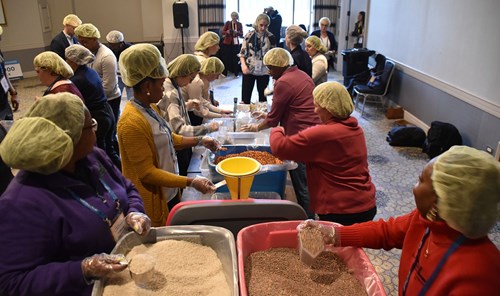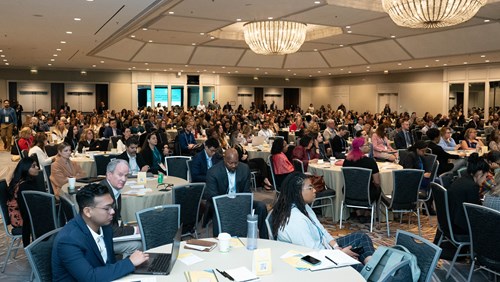More than 600 participants (the biggest RISE Summit on Social Determinants of Health to date) gathered this week at the Fairmont Chicago, Millennium Park for three days of learning, networking, and strategies to foster cross-sector collaboration. Here are highlights from select sessions.
State of the industry: Major strides but more work to do
Conference Chair Ellen Fink-Samnick, DBH, MSW, LCSW, ACSW, CCM, CCTP, CRP, principal, EFS Supervision Strategies, opened the conference by reviewing the progress that has been made in the social determinants of health (SDoH) space this year. These changes include, but are not limited to, the roll-out of new health equity accreditations by the National Committee for Quality Assurance; implementation of health equity standards by the Centers for Medicare & Medicaid Services and Joint Commission; advancement of ICD-10-CM Z codes, and the introduction of the Gravity Project.
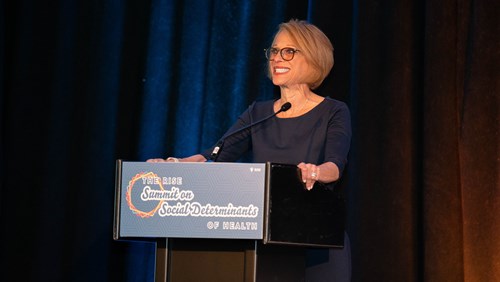
“But we have miles to go,” said Fink-Samnick, who also serves as the chair of RISE’s SDoH Community, noting that the country has a slew of what she describes as wholistic (spelled with a ‘w’ because she said we must consider the whole person) health equity determinants across SDoH and social determinants of mental health, political determinants of health, and ongoing systemic racism that continues to perpetuate them, particularly across marginalized and vulnerable populations. The current landscape, she said, includes:
- National health expenditures of $4.3 trillion dollars
- More than 11.5 million people behind in rent, and on any given day, more than 500,000 individuals and families living on the street
- A hundred million adults experiencing medical debt
- Close to 20 percent of families lack food to last one week
- Poor nutrition cited as the leading cause of illness, health care spending, and lost productivity
- Increased illness morbidity and mortality for persons of color, persons with disabilities, and members of the LGBTQIA+ Community
- Growing challenges in the ability to access preventive care for reproductive health, whether routine cancer screenings, mammograms, family planning, or other services
- Rural hospitals continue to close at alarming rates, or close OB/GYN and other specialty services due to a lack of providers
- Prescription medication access hampered
“And on top of this all…we are getting closer to that end date for the COVID-19 public emergency and its associated benefits; the monies many organizations have relied on to render care, especially safety net entities and community-based organizations,” she said. “We know there’s more happening, but that’s why you are all here. You are all the power of change. You have defined new delivery models of care, innovative technologies, creative resources, and programs. Over our next few days together, you will have opportunities to hear what is on the horizon, and discuss, identity, prioritize, network, and advance new cross-sector collaborations. You will fortify relationships that will bridge the gaps in care I mentioned and more, across every population, age group, practice setting, and sector.”
The need to address systemic racism as a driver of health inequity
Racism exists in every system, every structure, and every institution, said Seun Ross, DNP, MS, CRNP-F, NP-C, executive director, health equity, Independence Blue Cross, who moderated a panel discussion on systemic racism. “What we put in it is what we get out of it. We will consistently get back to inequities unless we change things,” she said.
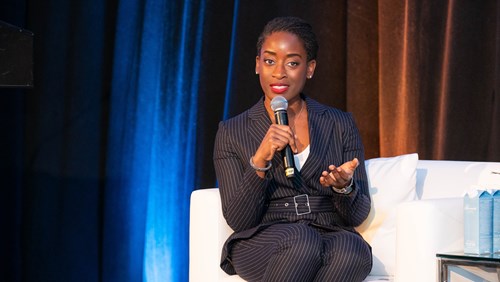
An obstacle to meaningful change is the lack of data that speaks to the drivers of inequities in health care and systemic racism, according to panelist John Adams, director of innovation and voice of customer, Gray Matter Analytics, who advocates for better data collection to begin to address health inequity.
Rachel J. Thornton, M.D., Ph.D., vice president, chief health equity officer, Nemours Children's Health, agreed that data is crucial. Organizations must accurately and consistently measure the differences in care delivery, access to care, and outcomes to know their patient populations. But even if your data is a work in progress, Dr. Thornton said it shouldn’t preclude you from using the data you have now to determine the disparities you need to address. Her advice: Address the greatest area for opportunity.
Adams said that organizations can use data to learn from and expose mistakes, as well as highlight areas that are doing well. “We need more data to make informed decisions, to act on data and provide great care based on that data,” he said. However, to make data-driven decisions, everyone in the organization must have the same understanding of what the data means.
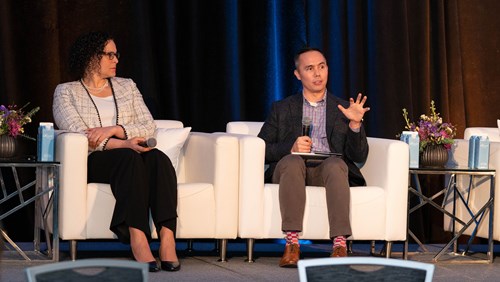
If you are unsure of which data points to collect, many organizations focus on community health, he said. They engage community partners to find out what is impacting health to understand the needs of the community. Social determinants and the way racism manifests itself in communities are different; there is no one-size-fits-all solution, Adams said. “We need to meet communities where they are at. What it comes down to is facilitating engagement in communities to understand how and why people are or are not seeking health care.”
Dr. Thornton also believes it’s important to have community health workers become members of your teams. “Despite our training and having lots of letters after our names, we may not know how their environment is navigated.”
Both panelists are hopeful that positive change can be made. Just having an open discussion about racism and inequities is a good start. “With all your voices and the voices beyond this room that are focusing on the health care industry’s purpose of serving every patient equitably and the broader purpose of advancing health beyond clinical care brings me hope. Because that is fundamental change and it is the purpose that unites us,” Dr. Thornton said.
Dr. Ross said change means having appropriate data, the right people at the table, and having conversations at conferences like the SDoH summit where we can collectively make a difference. “Having very direct conversations about rooting out systemic racism, we continue to make waves,” she said.
A dream vision: Renaming SDoH the Social determinants of life
During a health plan leadership panel on SDoH and health equity, one panelist suggested a different way to think of social determinants of health: The Social Determinants of Life.
Helene Roybal, chief transformation officer, AmeriHealth Caritas, said that her utopia for the role of payers is to think beyond the social determinants of health and start calling it the social determinants of life.
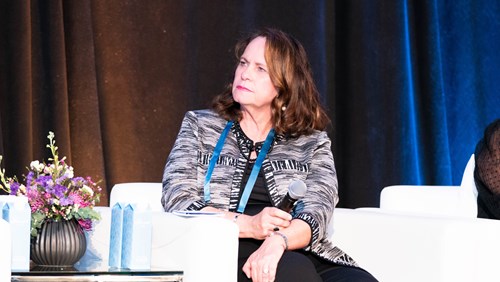
“We have members that live in the poorest ZIP codes in the country. The common thread is they all want to be economically independent to provide for themselves and families and their version of the American dream,” she said. “My utopia and my organization’s utopia is not to call it social determinants of health. We go beyond that. It’s whole person care. My biggest fear is that with the magic of community-based organizations, we start medicalizing community-based organizations and they become not what they were meant to do. What we are working on is to look at beyond health outcomes to life outcomes from wellness to resilience so our members can reach their American dream.”
Two amazing fireside chats on equitable health care for persons with disabilities, addressing SDoH beyond the clinic walls
Attendees heard two powerful and inspirational speakers on Tuesday.
First, Chanda Hinton, executive director, Chanda Center for Health and the Chanda Plan Foundation, discussed her journey as a patient advocate, particularly those with disabilities. Hinton became paralyzed below the chest at 9-years-old when an accidental shooting severed her spinal cord. She was thrown into the traditional medical model, which she said saved her life, but in some cases can be detrimental.
“I am alive due to health care,” she told moderator Olivia Jefferson, vice president for social responsibility, United Healthcare. “But for the long-term piece, we have to be better.”
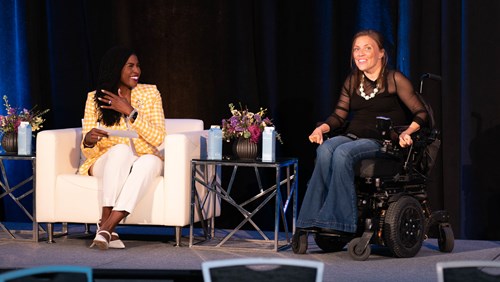
Hinton recalled that when she turned 21, she developed a secondary condition due to her spinal cord injury and was given opioids to treat her severe chronic pain. She unknowingly became addicted to Percocet. She became bed bound, her weight dropped to 59 pounds, was hospitalized, and again needed medical intervention to save her life. “So, the medical model saved my life when I was shot, but it didn’t do a good job with sustaining wellness and now I was again using medical intervention to save my life. When I looked at the pattern I didn’t want to go back to that vicious cycle,” she said.
That experience caused her to rethink how she would approach her spinal cord injury and seek proactive and preventive care to improve her quality of life and keep it cost effective. “What’s critical about that experience is it led me into the work I do today. I’m on Medicaid and I’m proud to be a Medicaid recipient and I also have a health center, where I am a provider and I’m an advocate.”
Hinton’s work has led to state legislation in Colorado to improve Medicaid eligibility for individuals and later the establishment of the Chanda Plan Foundation, a place where individuals with disabilities can receive integrative therapies through providers regardless of their ability to pay. The foundation helped close the gap by providing funding to people who needed preventive care while waiting to get approved for Medicaid. However, Hinton wanted to do more as she noticed providers are afraid to serve people with disabilities. “At the Chanda Center we became a health center that is fully disability competent. Barriers are broken down. " She said that when people come to the parking lot there is somewhere to park, there are automatic doors, and the front reception has desks at their eye level, where they can be seen. “When you get to the treatment room, yes, we will transfer to the table because you deserve access to care like everyone else.”
She urged attendees to consider persons with disabilities when they work on their health equity plans. “The reason why I want people in this room to take responsibility for that is because disability is a part of everyone of us at some point. At some point we all will interface with disabilities,” Hinton said, adding that aging is a disability. “You are preparing for your own futures. It’s our future, it’s your future, and it’s really important.”
Chanda Center has developed a disability competent curriculum that she is willing to share. Individuals, providers, and organizations interested in the curriculum can contact Hinton directly to get free access to the curriculum and resources.
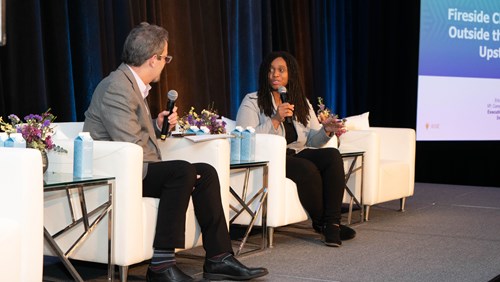
Next, Jasmine Zapata, M.D., MPH, award winning author, community leader, youth empowerment specialist, and board-certified physician specializing in the fields of pediatrics and preventive medicine, discussed her personal experience outside the clinic walls to impact SDoH in innovative ways. Zapata, who is known as Dr. Jazz, is the founder of the Beyond Beautiful Girls Empowerment Movement, which has impacted girls nationally and internationally via books, original music, live events, and positive youth development curricula. She told moderator Eric Schwartz, M.D., MBA, FACP, vice president, community health & transformation, executive director, Capital Health—Institute for Urban Care that her work involves addressing the adverse childhood experiences (ACEs), both inside and outside clinic walls to prevent ACEs and combat the long-term impacts of these traumas, which include child abuse and racism.
Dr. Jazz became involved in the girl empowerment movement as a physician when she was completing her pediatrics rotation training in the hospital ICU. A young girl had attempted suicide and as she worked to resuscitate her, Dr. Jazz said she heard a voice inside her that said even though you want to be a doctor, I’m calling you to do more. She found that by running community events for young girls that were fun and involved games and music, she could have serious discussions about issues of the heart during break out sessions that were more powerful and impactful then the 15 minute conversation she typically had once a year during their annual visits.
Her lesson: “Never give up. Even though life is hard, and you are at your lowest, you have a purpose for your life, you are valuable and you must keep pushing,” she said.
The presentation of RISE’s 2023 Health Care Hero Award
Congratulations to Rick Whitted, the CEO of U.S. Hunger, who received this year’s Health Care Hero Award, out of a field of 56 nominees. The prestigious award acknowledges an individual’s effort to make a significant impact on the lives of underserved populations through health care and/or social services interventions, and through superior example of the RISE mission to promote health equity among all patients.

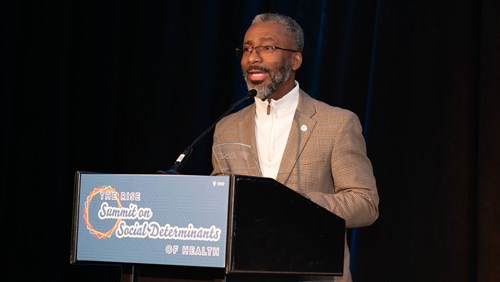
Whitted was chosen for his leadership and innovation in addressing food insecurity while also tackling the systemic causes of hunger and dramatically improving health and wellbeing.
RELATED: Rick Whitted named RISE’s 2023 Health Care Hero
Whitted joined U.S. Hunger as a board member in 2017 and became CEO in 2020. He has led several initiatives to further the fight against hunger, including a virtual food bank program, meal packaging events, and disaster relief worldwide. In 2022, Whitted and his team ran 198 Hunger Projects, packaging nearly nine million meals for families in need around the world. Through his unprecedented work in targeting the root causes behind food insecurity, Whitted has also led U.S. Hunger in collecting more than 160,000 survey responses to date from individuals who have shared their experiences with food insecurity.
“Rick Whitted is redefining how our industry approaches the interconnectedness between hunger and health. Rick recognized that food is just the beginning. He has committed to listening, documenting, and preserving the real-life stories of those affected by food insecurity. These collected voices provide the insight to address root causes and drive lasting change,” said the nomination.
Shout out to our food packing event volunteers
Special thank you to Whitted and all the attendees who volunteered their time Sunday for our food packing event in partnership with U.S. Hunger (Feeding Children Everywhere). We were able to pack 15,120 meals for the people of Chicago with the help of everyone involved.
